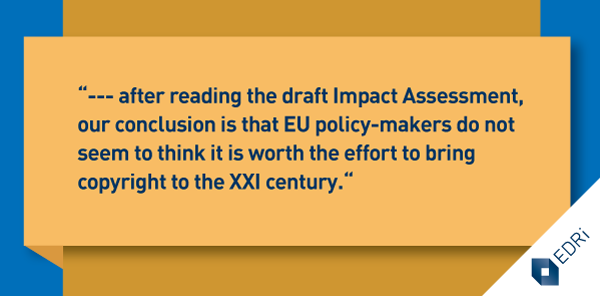Towards a corporate copyright reform in the EU?
On 24 August, Statewatch leaked the draft Impact Assessment (IA) of the European Commission (EC) on the copyright reform.
Impact Assessments are an essential part in the decision making process. They are where the EC analyses the different options available when considering a policy initiative. Ahead of the official presentation of the final IA in September 2016, the leak hints the range of proposals that could be adopted in the European Union (EU) on copyright matters.
During our copyfails blogpost series we described how badly the EU copyright regime is broken, and how these failures could be fixed if the political will existed. However, after reading the draft IA, our conclusion is that EU policy-makers do not seem to think it is worth the effort to bring copyright to the XXI century. Ignoring the results of the copyright consultation of 2014, and despite not having published the analysis on the results on the public consultation on ancillary copyright and freedom of panorama, the Commission has a plan: Let’s ignore all facts (even those previously identified) and avoid a real reform at all costs.

The draft text shows:
First, the long-awaited copyright reform is likely to become a patchwork of concessions to lobbyists’ demands. If a ban on geo-blocking was something that had any chance to be discussed, the film industry fought that idea, and has prevailed in its demands to maintain the borders in Europe’s “digital single market”. If news publishers wanted an EU wide version of the failed ancillary copyright initiatives to “tax” Google in Spain and Germany, they they will be delighted with the even more extravagant and dangerous position being adopted by the Commission. While the national-level initiatives have been very controversial and have lead to serious consequences, the Commission is going much further. “Ancillary copyright on steroids” seem to the Commission to be the best option, despite publishers themselves admitting that this measure, in their most optimistic possible scenario, would only lead to a ten-percent increase in revenues. Finally, when the music industry giants started complaining about how little money they get from YouTube (despite the billions they do receive), they were given a proposal to fix the so-called “value gap” extending the same system to other online platforms.
Second, once the corporate wish list was diligently followed, the Commission felt creative and thought that extending the automatic identification of works, based on Google’s Content ID, and making it the new standard would be a good idea. And why not adopt a Google product as a standard? Why not adopt a Google product that is regularly used to delete perfectly legal content? Why not give rights-holder the power to de facto overturn legislators’ decisions on copyright flexibilities? Why not create another barrier for Europe’s online entrepreneurs? The developer of a similar product boasted recently “Facebook came today and said we no longer want photos of kittens on our website, we could do that.” Industrial scale, accountability-free censorship.
The draft says that the measures implemented must be “proportionate”. So, courts cannot impose disproportionate measures on companies – apart from a huge amount of legal certainty, they are safe. However, there is no protection for citizens from companies choosing to implement disproportionate filtering measures. The “values gap” of the Commission is clear – copyright industry lobbyists get exactly what they asked for. Internet companies get a degree of protection. Citizens… nothing.
Content ID tools cannot deal with the nuances of copyright law. This will inevitably lead into restrictions on uses of cultural content which are permitted under legally safeguarded copyright flexibilities (“exceptions and limitations”), for example, copyrighted works in teaching environments. Furthermore, the huge costs of creating such a system would impede small and medium enterprises from competing in the market with giants like Google and seriously undermine the possibilities to create new businesses in Europe.
Despite the bad news that this draft IA brings, not everything is lost yet. The European Commission has time and the duty to fix the draft Impact Assessment and prepare the copyright reform that the EU needs. At this stage a solid alliance of diverse stakeholders is needed in order to subvert the corporate copyright reform that could be announced this month.
European Commission Staff Working Document Impact Assessment on the modernisation of copyright rules
http://statewatch.org/news/2016/aug/eu-com-copyright-draft.pdf
European Copyright Leak Exposes Plans to Force the Internet to Subsidize Publishers
https://www.eff.org/deeplinks/2016/08/european-copyright-leak-exposes-plans-force-internet-subsidize-publishers
Google snippet tax, geoblocking, other copyright reform shunned in EU plan
http://arstechnica.co.uk/tech-policy/2016/08/geoblocking-google-tax-copyright-reform-shunned-eu-plan/
Commissioner Oettinger is about to turn EU copyright reform into another ACTA
https://juliareda.eu/2016/08/copyright-reform-another-acta/
Copyfails: Time to #fixcopyright!
https://edri.org/copyfails/
Automated systems fight ISIS propaganda, but at what cost? (06.09.2016)
http://www.theverge.com/2016/9/6/12811680/isis-propaganda-algorithm-facebook-twitter-google
(Contribution by Diego Naranjo, EDRi)

